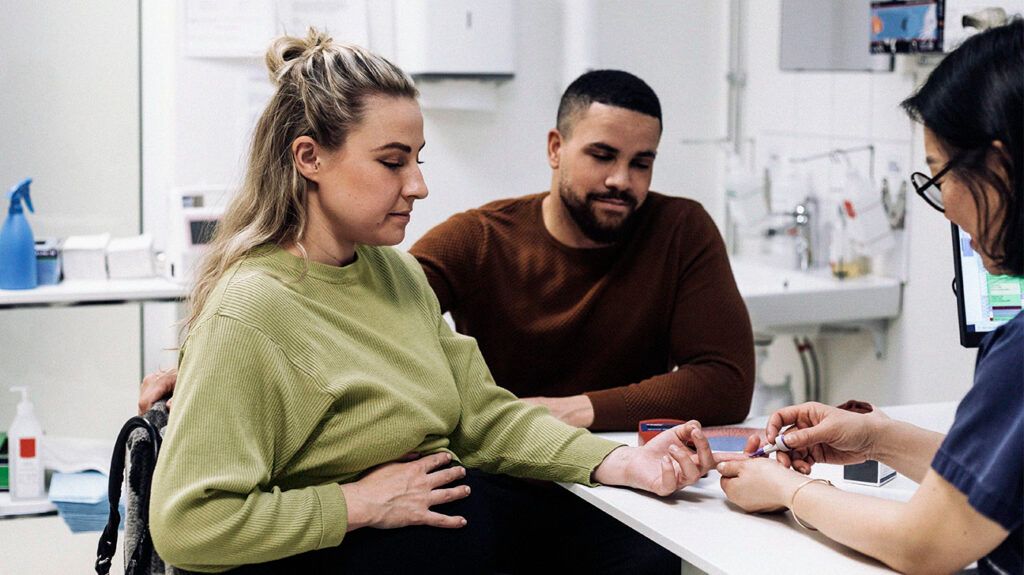High blood sugar during pregnancy, also known as gestational diabetes, can cause a baby to be born early. It can also cause excess weight gain, low blood sugar after birth, and breathing difficulties.
Gestational diabetes can affect the pregnant person, as well. For example, they might develop high blood sugar and have a higher risk of type 2 diabetes after giving birth.
People with high blood sugar should make sure to attend all of their doctor appointments during pregnancy. The doctor will likely ask them to monitor their blood sugar with a home test kit and make adjustments to their diet.
This article discusses the effects of high blood sugar on a baby, complications, management, and prevention. It also explains a condition called neonatal hypoglycemia and when to contact a doctor.

High blood sugar during pregnancy, or gestational diabetes, affects
Some of the possible effects on the developing fetus
- weighing too much, which may cause difficulty during delivery
- having low blood sugar after birth, called neonatal hypoglycemia
- being born too early
- having breathing difficulties
As the baby grows and gets older, they also have a higher risk of developing type 2 diabetes and obesity.
Gestational diabetes can increase the risk of complications for both the growing fetus and the birthing parent. However, having high blood sugar does not necessarily mean these will occur — they are just associated risks.
With proper monitoring and treatment, a person can manage most complications.
Complications affecting the fetus
Some possible risks to the growing baby
- a high red blood cell count
- high levels of bilirubin, which is a substance that forms when red blood cells break down
- low calcium levels
- neonatal hypoglycemia
- neonatal respiratory distress syndrome, which is a condition that causes breathing difficulties after birth
- shoulder dystocia, which happens when a baby’s shoulders get stuck during delivery
Complications affecting the birthing parent
Complications that may affect the pregnant individual include:
- high blood pressure (hypertension)
- preeclampsia, which is a condition involving high blood pressure and other symptoms, such as fluid retention and protein in the urine
- increased risk of cesarean delivery
- increased risk of developing type 2 diabetes after pregnancy
Neonatal hypoglycemia is one of the primary concerns for babies born to people with high blood sugar. It means that a newborn has low blood sugar in the first few days of life.
However, this condition is common, affecting
Symptoms can vary, but they may include
- sweating
- weak or high-pitched cry
- low body temperature
- lethargy
- feeding difficulties, such as inadequate suck
- tremors
- irritability
- low muscle tone
- rapid breathing or temporarily stopping breathing
- bluish tinge to the skin
In rare cases, the condition can cause seizures and coma. However, this is very uncommon, and healthcare professionals will monitor an infant with neonatal hypoglycemia closely.
Gestational diabetes is relatively common, and it is very manageable. It is important that people with this condition follow their doctor’s advice. This may
- Keeping all doctor appointments during pregnancy: This is crucial, as it allows a healthcare professional to monitor the pregnant person’s health and the baby’s growth.
- Checking blood sugar regularly: An individual can do this at home with a simple finger-prick testing device. Keeping an eye on blood sugar levels can alert someone when their levels are too high.
- Exercising regularly: Getting regular physical activity is good for health and blood sugar management. Learn more about exercising safely during pregnancy.
- Eating nutritious foods: A healthy eating pattern usually involves a balanced, varied diet high in lean proteins, healthy fats, and fruits and vegetables. A person should always follow the advice of a doctor or dietitian, though.
If these practices do not help a person manage their blood sugar, a doctor may prescribe insulin. This is the hormone that enables cells to take in glucose — or sugar — from the blood.
A doctor may also recommend a diabetes medication, such as metformin. This is sold under the brand names Fortamet and Glumetza.
Gestational diabetes
The condition typically develops around the 24th week of pregnancy. A doctor will order blood tests between 24 and 28 weeks as a standard practice to screen for gestational diabetes.
If a pregnant person receives a gestational diabetes diagnosis, they will need to check their blood sugar levels regularly. Their doctor will give them information on what readings are considered high. If their blood sugar checks indicate that their blood sugar is not well managed, they should contact their doctor.
Regardless of what someone’s blood sugar checks indicate, if they experience troubling symptoms, it is a good idea to seek medical attention.
High blood sugar during pregnancy can affect the baby in a range of ways, such as growing too quickly and being born early. It also increases the risk of neonatal hypoglycemia, a condition that causes low blood sugar after birth.
Gestational diabetes also affects the pregnant person, as it raises the likelihood of preeclampsia and the need for a cesarean section delivery.
Management strategies may involve getting adequate physical activity and eating a nutritious diet. Some people may need medications. To help prevent the condition, someone can engage in regular exercise and maintain an optimal weight before becoming pregnant.
Individuals with gestational diabetes should check their blood sugar regularly and notify their doctor if it is not in the typical range.
